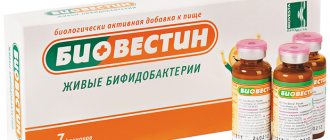Acipol Active
Acipol® Active is an ideal* probiotic: without water, once a day, 10 billion living beneficial bacteria!
Acipol® Active contains a complex of live beneficial lactobacilli rhamnosus and bifidobacteria longum - the most well studied, widely used throughout the world, with an established positive effect on human health1.
Advantages of Acipol® Active:
- Convenient release form, without water: Press! Mix it up! Have a drink!
- 1 bottle 1 time per day!
- Stored without refrigeration - convenient to take with you!
- Delicious: nice pear taste!
When to take Acipol® Active?
Acipol® Active can be used when there is an imbalance in the intestinal microflora associated with the use of drugs that suppress one’s own normal microflora (including antibiotics), when there is a change in climate, usual diet, manifestations of atopic reactions, and during seasonal surges of colds.
Composition of Acipol® Active
Suspension "Acipol® Active" is an innovative product of complex composition and action, containing:
- Probiotic Lactobacillus rhamnosus 5 x 109 CFU (5 billion)
- Probiotic Bifidobacterium longum 5 x 109 CFU (5 billion)
- Prebiotic inulin 500 mg
- Mineral zinc 5 mg
The action of "Acipol® Active" is due to the properties of the active components included in the composition, which enhance and complement each other's action (according to scientific data):
1. Lactobacilli (Lactobacillus rhamnosus)
According to the results of clinical studies of the use of Lactobacillus, it was shown:
- reducing the risk of developing microflora imbalance, including after taking drugs and agents that cause unfavorable changes in the qualitative or quantitative composition of the microbiocenosis of the gastrointestinal tract;
- against the background of stress and errors in diet;
- reduction in the frequency of colds;
- increase in nonspecific resistance of the body.
What are the benefits of Lactobacillus (Lactobacillus rhamnosus)?
- produce metabolites that selectively suppress the growth of pathogenic microflora;
- have an immunomodulatory effect.
INTERESTING: one study showed a significant decrease in body weight and fat mass when taking Lactobacillus rhamnosus and a prebiotic. Lactobacilli promote the formation of lactic acid, and the acidic environment created in this way has a beneficial effect on the development of bifidobacteria, which are also present in the Acipol® Active suspension;
2. Bifidobacterium (Bifidobacterium longum)
According to the results of clinical studies of the use of Bifidobacteria, it was shown:
- contribute to the normalization of the processes of enzymatic digestion of food, peristalsis and evacuation of intestinal contents;
- along with other representatives of the normal intestinal flora, they take an active part in digestion and absorption.
What are the benefits of Bifidobacterium longum?
The presence of a sufficient amount of bifidobacteria in the intestines and the normal state (BALANCE) of the intestinal microflora contributes to the synthesis of vitamins in the intestines, better absorption of food components and optimization of metabolic processes in the body.
A deficiency of bifidobacteria in the intestine can lead to gastrointestinal dysfunction.
Bifidobacteria support normal processes of parietal digestion in the intestine.
It is the complexes containing lactobacilli and bifidobacteria (including Lactobacillus rhamnosus and Bifidobacterium longum), according to a number of studies, that are characterized by good tolerability, a favorable safety profile, and the ability to reduce the risk of developing functional disorders of the gastrointestinal tract. An important property of the probiotics Lactobacillus rhamnosus and Bifidobacterium longum is their ability to attach to the intestinal epithelium, thereby ensuring and strengthening its barrier functions, as well as supporting immunity.
3. Inulin
Inulin is a prebiotic found in many plants. Serves as a food basis for the growth and reproduction of representatives of normal intestinal microflora (probiotics). Inulin not only promotes the growth and reproduction of its own beneficial intestinal microflora, but also stimulates intestinal motor activity, peristalsis, and optimization of the digestion process.
Clinical studies have shown that inulin stimulates the growth and activity of bifidobacteria and lactobacilli, which helps maintain the normal composition of the microbiota. One of the main features of the substance is that it enters the intestines almost unchanged, where it becomes a breeding ground for bifidobacteria and lactobacilli.
Inulin affects lipid metabolism, which helps reduce the risk of developing cardiovascular diseases and diabetes.
4. Zinc
It is part of the main enzymes and participates in various biochemical reactions; in the processes of synthesis and breakdown of carbohydrates, proteins, fats, nucleic acids, in the stabilization of cell membranes, has immunomodulatory properties, and is necessary for repair (healing) processes.
How to use Acipol® Active?
Inside, during meals. Adults: 1 bottle 1 time per day with meals.
Acipol Active suspension orally 10ml N5 (OTISI)
1. Lactobacilli (Lactobacillus rhamnosus). According to the results of clinical studies of the use of Lactobacillus, it was shown: a reduction in the risk of developing microflora imbalance, including after taking drugs and agents that cause adverse changes in the qualitative or quantitative composition of the microbiocenosis of the gastrointestinal tract; against the background of stress and errors in diet; reduction in the frequency of colds; increase in nonspecific resistance of the body. What are the benefits of Lactobacillus (Lactobacillus rhamnosus)? produce metabolites that selectively suppress the growth of pathogenic microflora; have an immunomodulatory effect. INTERESTING: one study showed a significant decrease in body weight and fat mass when taking Lactobacillus rhamnosus and a prebiotic. Lactobacilli promote the formation of lactic acid, and the acidic environment created in this way has a beneficial effect on the development of bifidobacteria, which are also present in the Acipol® Active suspension; 2. Bifidobacterium (Bifidobacterium longum). According to the results of clinical studies of the use of Bifidobacteria, it was shown: they contribute to the normalization of the processes of enzymatic digestion of food, peristalsis and evacuation of intestinal contents; along with other representatives of the normal intestinal flora, they take an active part in digestion and absorption. What are the benefits of Bifidobacterium longum? The presence of a sufficient amount of bifidobacteria in the intestines and the normal state (BALANCE) of the intestinal microflora contributes to the synthesis of vitamins in the intestines, better absorption of food components and optimization of metabolic processes in the body. A deficiency of bifidobacteria in the intestine can lead to gastrointestinal dysfunction. Bifidobacteria support normal processes of parietal digestion in the intestine. It is the complexes containing lactobacilli and bifidobacteria (including Lactobacillus rhamnosus and Bifidobacterium longum), according to a number of studies, that are characterized by good tolerability, a favorable safety profile, and the ability to reduce the risk of developing functional disorders of the gastrointestinal tract. An important property of the probiotics Lactobacillus rhamnosus and Bifidobacterium longum is their ability to attach to the intestinal epithelium, thereby ensuring and strengthening its barrier functions, as well as supporting immunity. 3. Inulin. Inulin is a prebiotic found in many plants. Serves as a food basis for the growth and reproduction of representatives of normal intestinal microflora (probiotics). Inulin not only promotes the growth and reproduction of its own beneficial intestinal microflora, but also stimulates intestinal motor activity, peristalsis, and optimization of the digestion process. Clinical studies have shown that inulin stimulates the growth and activity of bifidobacteria and lactobacilli, which helps maintain the normal composition of the microbiota. One of the main features of the substance is that it enters the intestines almost unchanged, where it becomes a breeding ground for bifidobacteria and lactobacilli. Inulin affects lipid metabolism, which helps reduce the risk of developing cardiovascular diseases and diabetes. 4. Zinc. It is part of the main enzymes and participates in various biochemical reactions; in the processes of synthesis and breakdown of carbohydrates, proteins, fats, nucleic acids, in the stabilization of cell membranes, has immunomodulatory properties, and is necessary for repair (healing) processes.
Drops Acipol Baby
> References
Advantages
*
- Associated with an imbalance of intestinal microflora (see leaflet).
Symptoms
**
— Atopy is one of the most common types of dermatosis, the manifestation of which is inflammation of the skin associated with an allergic reaction
Composition and effects
1
— Elazab N. et al. Probiotic Administration in Early Life, Atopy, and Asthma: A Meta-analysis of Clinical Trials. PEDIATRICS Volume 132, Number 3, September 2013
2
— Elazab N. et al. Probiotic Administration in Early Life, Atopy, and Asthma: A Meta-analysis of Clinical Trials. PEDIATRICS Volume 132, Number 3, September 2013; Kalliomaki M, Salminen S, Arvilommi H, Kero P, Koskinen P, Isolauri E. Probiotics in primary prevention of atopic disease: a randomized placebo-controlled trial. Lancet 2001; 357:1076-9.
3
-Synbiotic in the management of infantile colic: a randomized controlled trial. Kianifar H1, Ahanchian H, Grover Z, Jafari S et al. J Paediatr Child Health. 2014 Oct;50(10):801-5. doi: 10.1111/jpc.12640. Epub 2014 Jun 24.
4
-L Lactobacillus GG in the prevention of antibiotic associated diarrhea in children Jon A. Vanderhoof, MD, David B. Whitney. THE JOURNAL OF PEDIATRICS VANDERHOOF ET AL VOLUME 135, NUMBER 5.
5
-Lactobacillus rhamnosus GG Supplementation for Preventing Respiratory Infections in Children: A Meta-analysis of Randomized, Placebo-controlled Trials. SHAN LIU, PENGWEI HU. INDIAN PEDIATRICS. VOLUME 50, APRIL 16, 2013; Elazab N. et al. Probiotic Administration in Early Life, Atopy, and Asthma: A Meta-analysis of Clinical Trials. PEDIATRICS Volume 132, Number 3, September 2013
Situations of use
Disorders of the intestinal microflora in a baby
1.
Kato, K et al. Changes in the composition of intestinal bifidobacteria species associated with age // Nast. Microbiol. . – 2021. – T. 74. – No. 8. – pp. 987-995
2.
Avershina E. et al. Continuity and correlation of the network of bifidobacteria in a large unselected cohort of mothers and their children // Applied and environmental microbiology. – 2013. – T. 79. – No. 2. – pp. 497-507.
3.
Martin R. et al. Early life events, including mode and type of feeding, kinship, and gender, that shape the developing gut microbiota // Public Library of Science One - 2021. - Vol. 11. - No. 6. – P. e0158498.
4.
Dubois N.E., Gregory K.E. Characteristics of the intestinal microbiota in intestinal colic: results based on an integrative review of the literature. Biological Research for Nurses. - 2021. - T. 18. - No. 3. - pp. 307-315.
5.
Zakharova I. N. et al. Infantile intestinal colic: a modern view of the problem // Cons. Med. Pediatrics. – 2014. – No. 4. – pp. 46-53.
6.
Milani S et al. The first microbial colonizers of the human intestine: composition, activity and consequences for the health of the intestinal microbiota of infants // Review of Microbiology and Molecular Biology. – 2021. – T. 81. – No. 4. – P. e00036-17.
7.
Koppen IJN et al. Pediatric Rome IV criteria: What's new? // Expert review of gestroenterology and hepatology. – 2017. – T. 11. – No. 3. – pp. 193-201.
8.
Belaiche M. et al. Multiple functional gastrointestinal disorders are common in formula-fed infants and reduce their quality of life / Acta Paediatrica. – 2021. – T. 107. – No. 7. – pp. 1276-1282.


